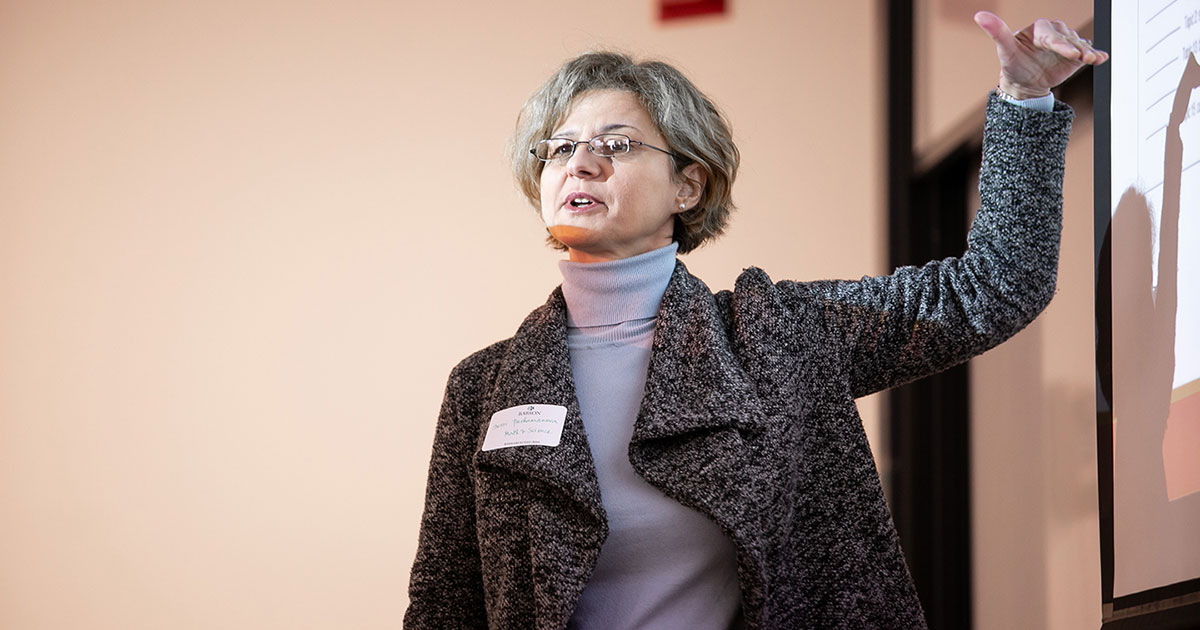Bridging Business and Health Care to the Benefit of Students

The past few months aside, much has changed in the nearly 20 years Dessislava Pachamanova has taught at Babson.
When she joined the College in 2002, her primary field of research was in risk management. Now, preparing her plan for the fall semester amid the pandemic, her recent shift to healthcare research introduces authentic, timely examples, to the benefit of her students.
“Gone are the times when instructors could give students canned examples in the classroom,” she says. “Students should be exposed to real problems, (where) they are engaged in finding a solution.”
Embracing Ambiguity
Pachamanova says incorporating real world issues allows students to dive into the revolving changes our current situation brings. It also stimulates classroom discussion on how today’s students can become the difference makers of tomorrow.
“A crisis like this, it really upsets the status quo. You need to be flexible about the way you approach things and you need to think on your feet,” she says. “In the current situation, no solution is perfect. I want to expose my students to that kind of ambiguity.”
Pachamanova’s interest in health care research, which began in the years preceding the pandemic, was driven by a desire to solve the most challenging problems that have direct impact on human lives, and is aligned with the mindset of many of her students.
Her recent work has included understanding the impact of the Medicare Hospital Readmission Reduction Program on vulnerable populations with Associate Professor Yunwei Gai, and the development of a framework for analyzing medical innovation using text data in partnership with Professor Sinan Erzurumlu.
“Gone are the times when instructors could give students canned examples in the classroom. Students should be exposed to real problems, (where) they are engaged in finding a solution.”
Professor Dessislava Pachamanova
She also has been collaborating with medical professionals to reduce patient stays at hospitals by optimizing operations within units. Advanced data processing and cutting-edge algorithms powered the findings.
“Healthcare optimization very often requires a combination of different techniques,” Pachamanova said. “The problems are so complex that you’re not just looking at one particular thing and improving it. You have to utilize a range of different models.”
Pachamanova does not see her research as separate from her teaching. In fact, her research allows her to bring these real world problems into her classroom. For example, students in her class log into secure virtual machines so that they can experience the challenges of working with the real data themselves, and so that they can develop operational strategies for routing patients to hospital units using advanced machine learning techniques.
“I love to learn. One cannot be a good teacher without continuously learning. And, I want my students to be right behind me, learning what I have just learned.”
Navigating Problems, Creating Solutions
Pachamanova co-led the designs of the College’s MBA and undergraduate business analytics concentrations and the Master of Science in Business Analytics program, all of which train future business leaders to navigate complex business problems and create innovative solutions.
The goal of these initiatives is to teach rigorous analytics skills with an entrepreneurial flavor, and prepare Babson students well for the ambiguity in the world today.
“Babson’s entrepreneurial roots help keep our analytics programs focused on real world problems. Our goal is to empower Babson students to use the unique skill set our analytics programs provide in their own careers and businesses in an unpredictable world. Part of how I pursue this goal is by bringing the students with me on my research journey.”
Posted in Insights






